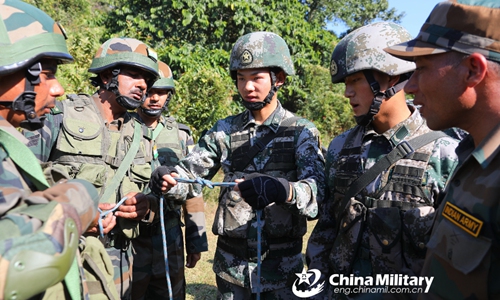China-India border talks prevent another ‘Doklam’ but standoff unlikely to end immediately: experts
By Liu Xuanzun Source:Global Times Published: 2020/6/8 13:31:52
China-India border talks prevent another 'Doklam standoff'

Chinese and Indian soldiers exchange on how to tie a square knot prior to a cliff-climbing training exercise at Umroi Cantonment, capital city of Meghalaya in northeast India, on December 14, 2019. The 8th China-India "Hand-in-Hand 2019" Joint Counter-terrorism Exercise kicked off on Dec. 7, 2019. The 16-day exercise, which consists of three phases of adaptation training, mixed training and comprehensive exercises, mixed Chinese and Indian troops into two groups to jointly conduct counter-terrorism tactical drills. (eng.chinamil.com.cn/Photo by Wang Hao)
The ongoing border dispute between China and India will not escalate into a conflict or another Doklam standoff after military commanders from both sides held talks on Saturday that resulted in positive agreements on peacefully resolving the situation, Chinese foreign ministry and experts said on Monday.
However, due to the complexity of the situation, the military standoff could continue for a little longer, analysts noted.
Militaries of China and India on Saturday held army commander-level talks on a resolution of recent border situation and maintaining peace and tranquility in the border regions, Hua Chunying, spokesperson at China's Ministry of Foreign Affairs, said at a routine press conference on Monday.
Both sides have kept close contact over the current border situation through diplomatic and military channels since recently, and both sides have reached a consensus that we should carry out our leaders' important consensus, not escalate the dispute into a conflict, maintain peace and tranquility in border areas together and create a good atmosphere for the stable development of healthy bilateral relations, Hua said.
Currently the China-India border situation is generally stable and controllable, and both sides are willing and capable of resolving related issues well via negotiations and talks, Hua stressed.
According to a statement the Indian Ministry of External Affairs released on Sunday, both sides agreed to peacefully resolve the situation in the border areas in accordance with various bilateral agreements.
Both sides also noted that this year marked the 70th anniversary of the establishment of diplomatic relations between the two countries and agreed that an early resolution would contribute to the further development of the relationship, the Indian statement reads.
The talks between the two countries' senior military officers came at a time when China-India border tensions flared up after India recently illegally constructed defense facilities across the border into Chinese territory in the Galwan Valley region, and Chinese border defense troops countered with increased border control measures.
Qian Feng, a senior fellow at the Taihe Institute and director of the research department of the National Strategy Institute at Tsinghua University in Beijing, told the Global Times on Monday that the recent talks involved high-ranking officers from both militaries, indicating that both sides are paying great attention to the situation and do not want to escalate it.
It showed that China and India remain determined to peacefully resolve border issues, Qian said, noting that both sides have the strategic wisdom to see through the US' ulterior motive in intervening and encouraging India to confront China at a time when China-US relations are deteriorating.
Media reports suggest both sides have been reinforcing their troops in the border areas, leading to another standoff that some said will become a second Doklam crisis.
This will not be the case, as both sides have gained a great deal of experience from the Doklam incident in 2017, and since then all kinds of bilateral mechanisms including on military, diplomatic and local issues have been established, which has eliminated the possibility of an incident escalating into a crisis, experts noted.
That being said, the ongoing standoff is not likely to end immediately, as concrete issues must still be resolved, Qian said. The trigger of the event, India's construction of infrastructure on Chinese territory, must be stopped, or China will not accept the situation, he said.
Newspaper headline: China-India border talks prevent another 'Doklam standoff'